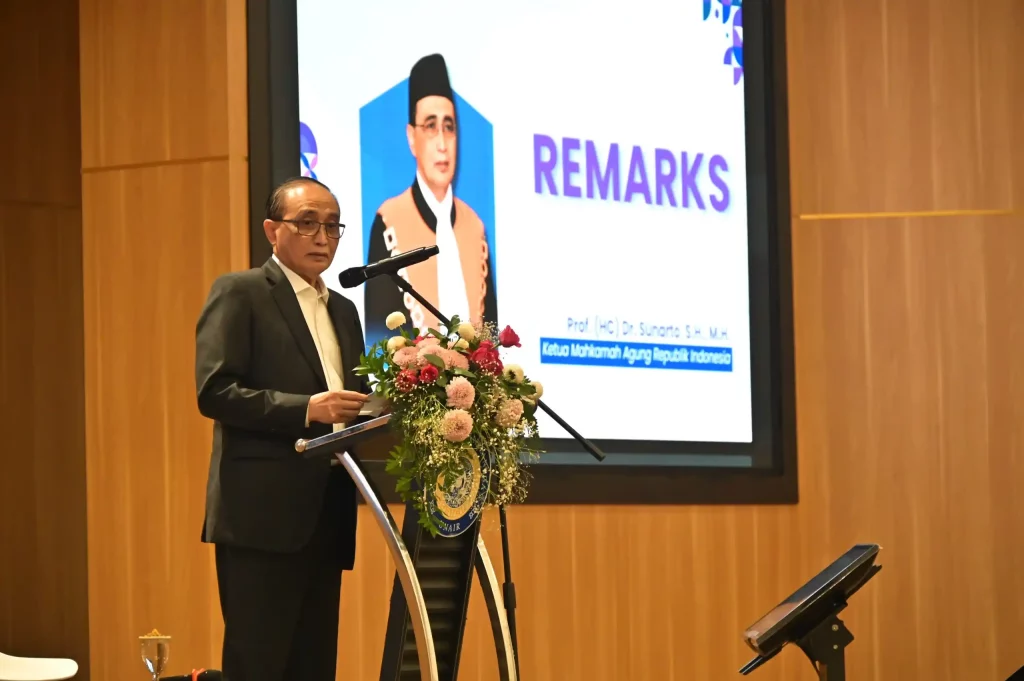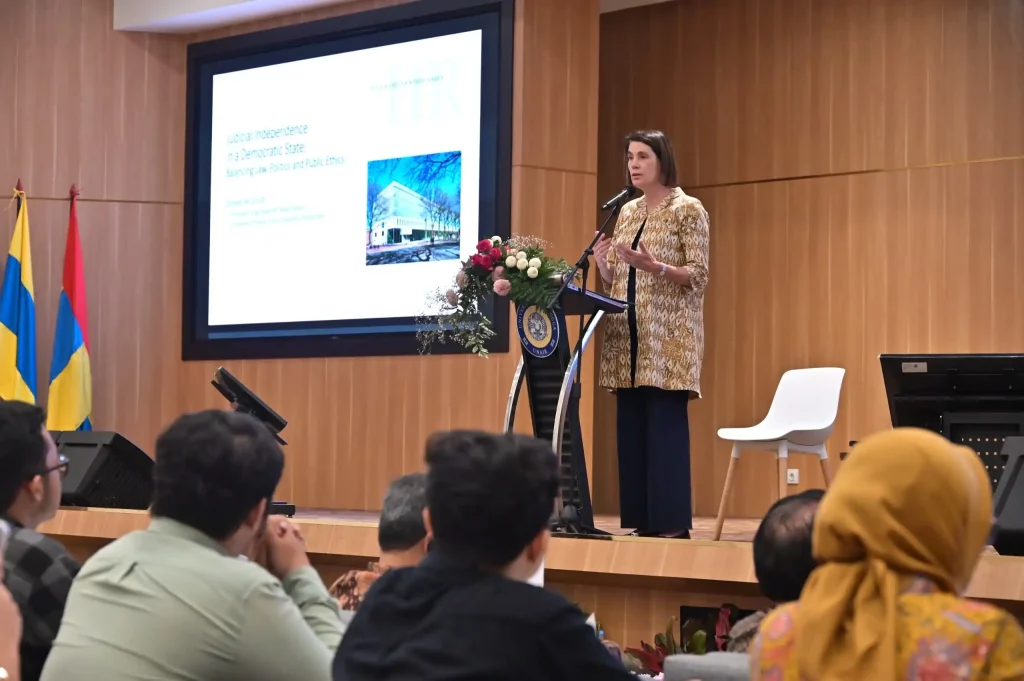UNAIR NEWS – Universitas Airlangga’s Faculty of Law (FH UNAIR) recently hosted an Honorary Lecture centered on the theme “Judicial Independence in a Democratic State: Balancing Law, Politics, and Public Ethics.” The event took place on Tuesday (June 17, 2025) at the 12th-floor auditorium of the G. Pringgodigdo Building on the Dharmawangsa-B campus.
The lecture featured Prof. (HCUA) Dr. Sunarto, S.H., M.H., Honorary Professor at FH UNAIR and Chief Justice of Indonesia’s Supreme Court, alongside Prof. G. Dineke de Groot, President of the Supreme Court of the Netherlands and Professor at Vrije Universiteit Amsterdam.
Indonesia’s Supreme Court initiatives
During his remarks, Prof. Sunarto outlined several key strategies implemented by Indonesia’s Supreme Court to reinforce judicial independence. The first approach focuses on strengthening judicial integrity, capacity, and professionalism through a balance of internal and external oversight mechanisms. “External oversight is carried out by the Judicial Commission, while internal oversight is handled by the Supreme Court’s supervisory body,” he explained.

A third strategy is to pursue financial autonomy. The fourth emphasizes the importance of collaborating with civil oversight organizations. “The Supreme The second strategy involves modernizing the court’s management systems. To support the shift to an electronic-based system, funding is required for both software and hardware infrastructure. “What’s particularly commendable is that these advancements have been carried out entirely by the Supreme Court’s own personnel,” Prof. Sunarto noted.
A third strategy is to pursue financial autonomy. The fourth emphasizes the importance of collaborating with civil oversight organizations. “The Supreme Court remains open to partnerships that enhance integrity and build public trust,” he stated. Currently, the Court works with the Financial Transaction Reports and Analysis Center (PPATK), the Judicial Commission (KY), the Corruption Eradication Commission (KPK), and several NGOs to advance these goals.
Balancing judicial authority
Prof. Dineke de Groot emphasized that judicial independence is a foundational element of any democracy governed by the rule of law. She highlighted the need to maintain equilibrium between legal authority, political dynamics, and public ethics to ensure a judiciary that is both legitimate and effective.
She offered a thorough analysis of the judiciary’s role in a modern democratic system. “Undermining the judiciary does more than weaken judges—it erodes the very foundation of democracy,” she said, quoting Christophe Soulard, President of France’s Court of Cassation, from an interview with Le Monde.
Prof. de Groot explained that a law-based democracy is characterized by a separation of powers among the legislative, executive, and judicial branches. It is also underpinned by values such as legal certainty, transparency, freedom of the press, and the protection of fundamental rights, including those of minority groups.
Public ethics and judicial integrity
Prof. de Groot further argued that judicial independence is not solely about freedom from political interference. It also encompasses the personal integrity and professionalism of judges, as well as an institutional culture that upholds public ethical standards.
“An independent judge must be free from external pressure and inappropriate relationships within the judiciary. Judges must actively promote high ethical standards to strengthen public confidence in the courts,” she said, referencing the Bangalore Principles of Judicial Conduct adopted by the United Nations.
She also addressed the challenges posed by judges expressing personal views in public forums. While acknowledging the right to free speech, she stressed that such expressions must not compromise the dignity and impartiality of the judiciary.
“In principle, judges are entitled to voice opinions on social matters, but that freedom is not unlimited. They must always safeguard the public’s perception of the judiciary’s neutrality and authority,” she added.
In closing, Prof. de Groot delivered a powerful message: true judicial independence can only thrive within a clear legal framework, strong institutional practices, and a professional culture grounded in integrity and accountability.
Author: Febriana Putri Nur Aziizah
Editor: Yulia Rohmawati









